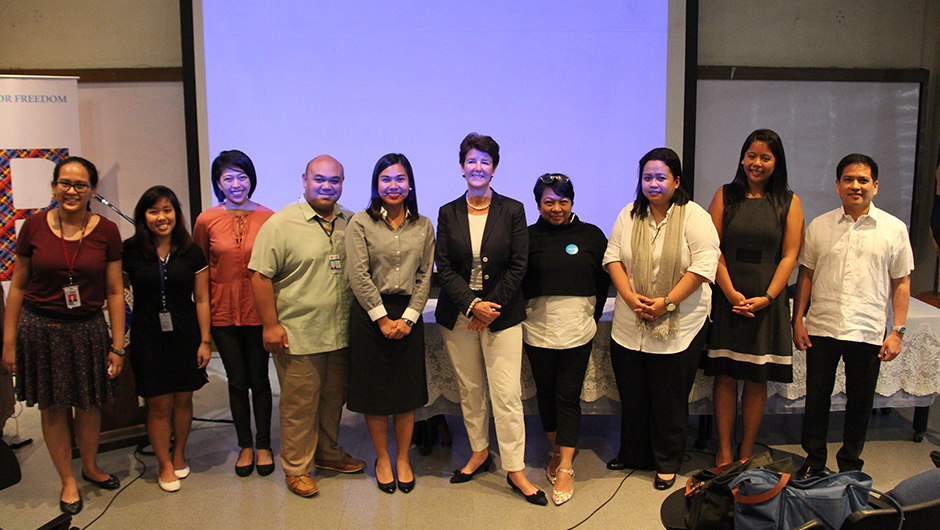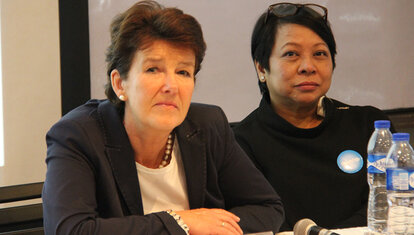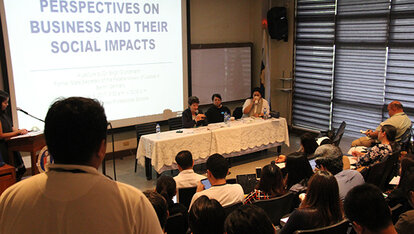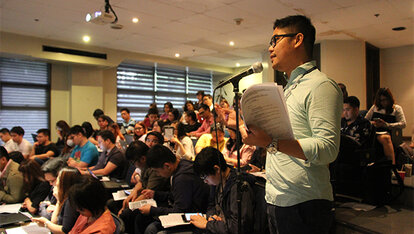The Primacy of Human Rights in Business: Learning from the German Experience

“Worldwide protection of human rights is an important objective in my country and for the EU.”
On 9 November 2017, Dr. Birgit Grundmann, former state secretary of the Federal Ministry of Justice in Germany, spoke before students and professors of law at the Ateneo Law School in Makati City, where she shared how Germany’s unique historical and socio-political experiences have cultivated a strong system of respect and protection of rule of law and human rights. More specifically, she extensively discussed the role of the public and private sectors in the evolving concept of business and human rights.

“The core of the German Constitution and their economic model is the individual - his dignity and freedom, not the state. This brought positive results in the economy with the help of other institutional mechanisms, such as the federal constitutional court under the rule of law,” Grundmann emphasized.
She also added that the German legal institution contains numerous instruments that are focused to protect human rights. These rules are all binding on all enterprises. However, this is not the case for most of the countries. Therefore, responsible shaping of successful globalized world is important for Germany.
Following the United Nations Human Rights Council adoption of the guiding principles of business and human as a reference framework, the European Union urged its members to develop and present their National Action Plan for the implementation of the UN Guiding Principles (UNGP) on Business and Human Rights (BHR). Germany has presented their own in 2006. The aim is to improve human rights situation along the supply chain in Germany and worldwide with help of different stakeholders. The government clearly pointed out in the framework that the companies must carry out human rights diligence and must comply to the human rights standards on all local and international business transactions. Through this, a wide monitoring procedure was established to ensure that every business adhere to the rules and that legal charges should be filed to those who refused to.

“The duty to protect human rights continues to lie on the state. This is very important to know,” Dr. Grundmann emphasized.
Joining Dr. Grundmann in the panel discussion to present the case of the Philippines in the context of protecting children’s rights in business, is Ms. Georgina Belardo, Corporate Alliance Officer from the United Nations International Children’s Fund - Philippines. She emphasized that children are the future of the businesses. They are the future employees and employers so business practices and its social impacts that involves them are worth-looking because its how you will achieve sustainability. Breastfeeding in the workplace policy was used as an example. Statistically, babies that are formula-fed have higher risk of getting sick more often. That being said, there will be one day more absences at work by the parents and even if they go to their workplaces, they may not be as productive thinking that they have sick babies at home. This also means, companies will have to pay more for healthcare insurance cost. However, if this policy is applied, it avoids the businesses to incur further cost. For the mothers, she will be protected from ovarian cancer for the rest of her life while the children will be protected from fatal diseases for the rest of their lives. They will finish more years of school and they will even earn 50% more in wages as adults. This will eventually lead to 2% increase in Gross Domestic Product.

“Global investors look at their sustainability reports first, not financial reports. Higher ESG investments (Environmental, Social and Governance issues that are supposed to be monitored by the companies) that are being looked at more than your profits,” shared Ms. Belardo.
Dr. Grundmann remarked at the end of her lecture, “Though there are challenges, I’m quite optimistic because in recent years, the awareness on human rights questions on international markets constantly grew.”
Mr. Wolfgang Heinze, FNF’s Head of country noted, “These simple contributions, such as good nutrition and improved working conditions to the parents and to their children, could lead to a significant development in the economy. Therefore, we encourage the stakeholders to integrate Human Rights on their respective business models here in the Philippines.”